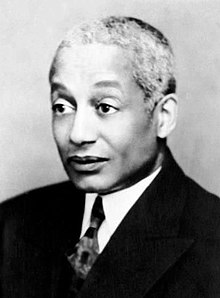Alain LeRoy Locke | |
|---|---|
 | |
| Born | Arthur Leroy Locke[1] September 13, 1885 Philadelphia, Pennsylvania, U.S. |
| Died | June 9, 1954 (aged 68) New York City, New York, U.S. |
| Resting place | Congressional Cemetery |
| Occupation | Writer, philosopher, educator, and patron of the arts |
| Language | English |
| Education | Harvard University Hertford College, Oxford University of Berlin |
| Official name | Alain Leroy Locke (1886–1954) |
| Type | City |
| Criteria | African American, Education, Professions & Vocations, Writers |
| Designated | 1991 |
| Location | 2221 S 5th St., Philadelphia 39°55′14″N 75°09′20″W / 39.92065°N 75.15545°W |
Alain LeRoy Locke (September 13, 1885 – June 9, 1954) was an American writer, philosopher, and educator. Distinguished in 1907 as the first African American Rhodes Scholar, Locke became known as the philosophical architect—the acknowledged "Dean"—of the Harlem Renaissance.[2] He is frequently included in listings of influential African Americans. On March 19, 1968, the Rev. Dr. Martin Luther King Jr. proclaimed: "We're going to let our children know that the only philosophers that lived were not Plato and Aristotle, but W. E. B. Du Bois and Alain Locke came through the universe."[3]
- ^ Stewart, Jeffrey C. (2018). The New Negro: The Life of Alain Locke. Oxford University Press. pp. 15–16. ISBN 978-0195089578.
- ^ Kirsch, Adam (March–April 2018). "Art and Activism: Rediscovering Alain Locke and the project of black self-realization". Harvard Magazine. Retrieved March 6, 2020. review of Jeffrey C. Stewart, The New Negro: The Life of Alain Locke (Oxford University Press, 2018)
- ^ Cone, James H. (2000). Risks of Faith: The Emergence of a Black Theology of Liberation, 1968–1998. Beacon Press. p. 152. ISBN 9780807009512.